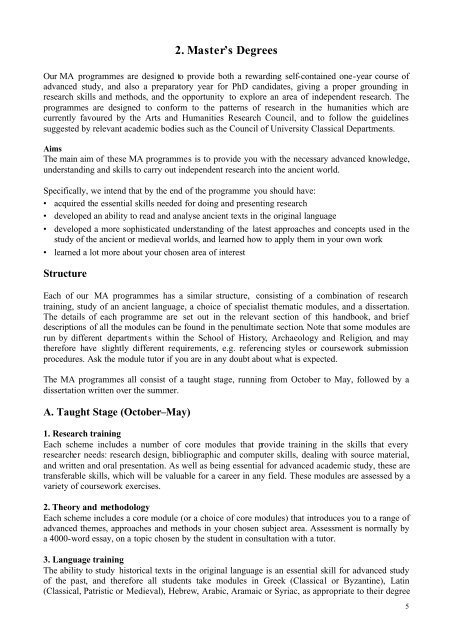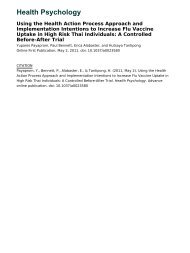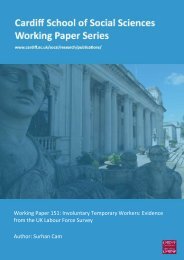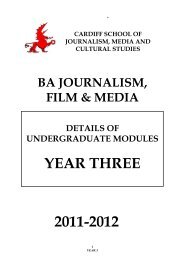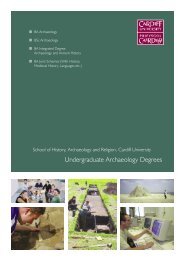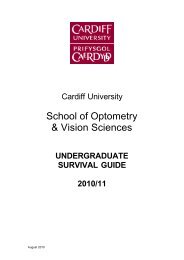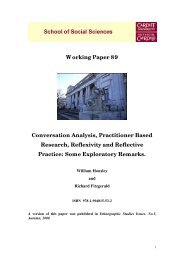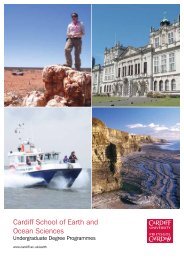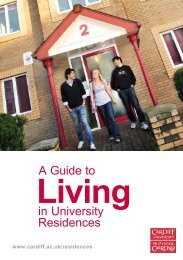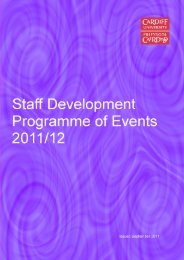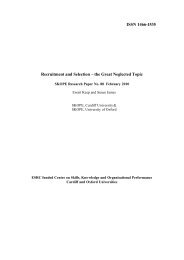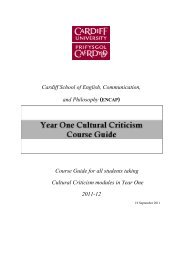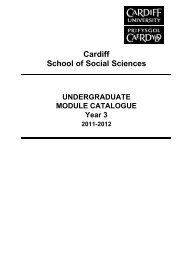MA handbook AH 2011-12.docx - Cardiff University
MA handbook AH 2011-12.docx - Cardiff University
MA handbook AH 2011-12.docx - Cardiff University
You also want an ePaper? Increase the reach of your titles
YUMPU automatically turns print PDFs into web optimized ePapers that Google loves.
2. Master’s Degrees<br />
Our <strong>MA</strong> programmes are designed to provide both a rewarding self-contained one-year course of<br />
advanced study, and also a preparatory year for PhD candidates, giving a proper grounding in<br />
research skills and methods, and the opportunity to explore an area of independent research. The<br />
programmes are designed to conform to the patterns of research in the humanities which are<br />
currently favoured by the Arts and Humanities Research Council, and to follow the guidelines<br />
suggested by relevant academic bodies such as the Council of <strong>University</strong> Classical Departments.<br />
Aims<br />
The main aim of these <strong>MA</strong> programmes is to provide you with the necessary advanced knowledge,<br />
understanding and skills to carry out independent research into the ancient world.<br />
Specifically, we intend that by the end of the programme you should have:<br />
• acquired the essential skills needed for doing and presenting research<br />
• developed an ability to read and analyse ancient texts in the original language<br />
• developed a more sophisticated understanding of the latest approaches and concepts used in the<br />
study of the ancient or medieval worlds, and learned how to apply them in your own work<br />
• learned a lot more about your chosen area of interest<br />
Structure<br />
Each of our <strong>MA</strong> programmes has a similar structure, consisting of a combination of research<br />
training, study of an ancient language, a choice of specialist thematic modules, and a dissertation.<br />
The details of each programme are set out in the relevant section of this <strong>handbook</strong>, and brief<br />
descriptions of all the modules can be found in the penultimate section. Note that some modules are<br />
run by different departments within the School of History, Archaeology and Religion, and may<br />
therefore have slightly different requirements, e.g. referencing styles or coursework submission<br />
procedures. Ask the module tutor if you are in any doubt about what is expected.<br />
The <strong>MA</strong> programmes all consist of a taught stage, running from October to May, followed by a<br />
dissertation written over the summer.<br />
A. Taught Stage (October–May)<br />
1. Research training<br />
Each scheme includes a number of core modules that provide training in the skills that every<br />
researcher needs: research design, bibliographic and computer skills, dealing with source material,<br />
and written and oral presentation. As well as being essential for advanced academic study, these are<br />
transferable skills, which will be valuable for a career in any field. These modules are assessed by a<br />
variety of coursework exercises.<br />
2. Theory and methodology<br />
Each scheme includes a core module (or a choice of core modules) that introduces you to a range of<br />
advanced themes, approaches and methods in your chosen subject area. Assessment is normally by<br />
a 4000-word essay, on a topic chosen by the student in consultation with a tutor.<br />
3. Language training<br />
The ability to study historical texts in the original language is an essential skill for advanced study<br />
of the past, and therefore all students take modules in Greek (Classical or Byzantine), Latin<br />
(Classical, Patristic or Medieval), Hebrew, Arabic, Aramaic or Syriac, as appropriate to their degree<br />
5


